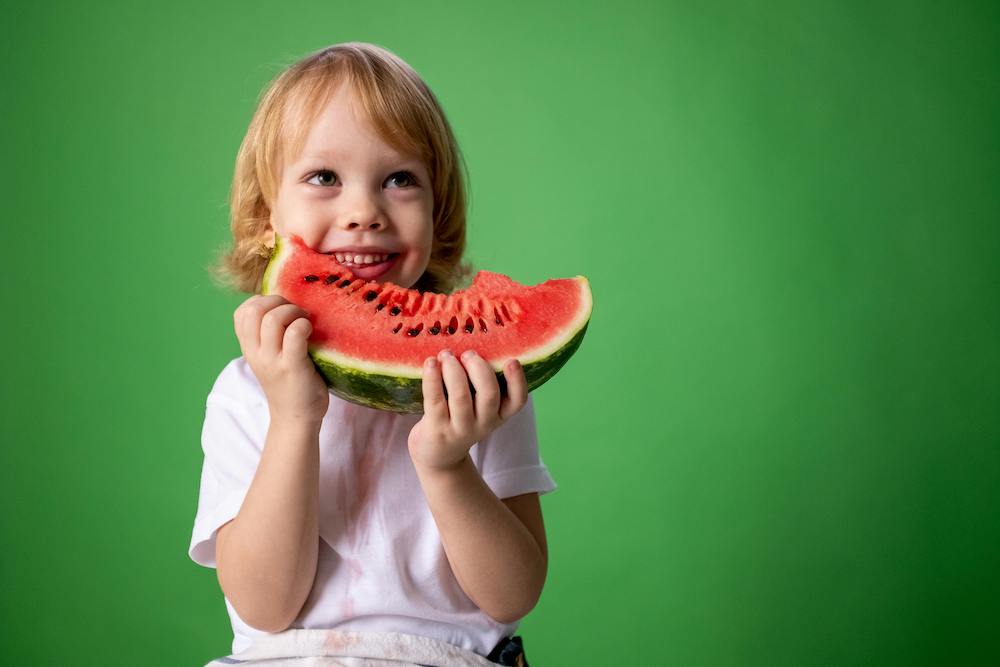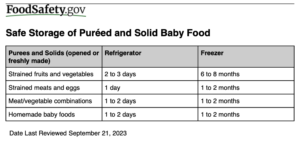
09 Sep Food Safety for Older Babies
For children under 5 years old, avoid serving raw, undercooked, and unpasteurized foods.
At 6 months old, most babies are developmentally ready to start supplementing their human milk or formula diet with baby foods. One of the biggest concerns when starting babies on solids is preventing bacterial illness.
Young children under 5 produce less stomach acid than adults so they are less equipped to kill harmful bacteria that cause illness. Additionally, vomiting and diarrhea can quickly lead to dehydration, causing a serious health issue. This is why following safe food preparation and storage for your little one is so very important!
In general, you’ll want to avoid serving raw, undercooked, and unpasteurized foods to kids under 5 years old.
Here are the highlights:
- When preparing your baby’s foods, always start with thorough hand washing and cleaning your meal prep surfaces.
- During food prep, prepare raw meat, poultry, seafood and eggs separately from vegetables and other food.
- Be sure to cook meats to the correct internal temperatures to kill all the bacteria inside. Check out the U.S. Department of Health and Human Services printable food temperature chart.
- When it comes to eating, make it a ritual to wash your baby’s hands too. Later, when she’s older, she’ll learn to do this before every meal. This healthful practice cuts the chain of infection between unclean hands that allow bacteria and viruses to enter the body via the mouth.
- Refrigerate unused food promptly. Bacteria love to multiply in temperatures between 40-140 degrees Fahrenheit.
If you’re feeding your baby pureed foods, there are different guidelines with preparing, serving and storing store-bought versus homemade infant foods. Here are the takeaways!
STORE-BOUGHT INFANT FOODS:
- Inspect the containers. Don’t buy chipped jars or those with rusty lids or popped safety buttons. Don’t buy pouches that are swollen or leaking. Make sure safety seals are intact and the containers haven’t expired.
- Before serving, rinse the containers in hot, soapy water before opening. Get that dust and micro dirt off! Serve the food in a separate dish.
- Store open-jarred food in the fridge for 48 hours; 24 hours for meats.
- Don’t freeze jarred infant foods.
HOMEMADE INFANT FOODS:
- Clean hands, utensils, and work surfaces prior to food prep.
- Use fresh not leftover foods (previously prepared foods left at room temperatures)
- Serve freshly prepared baby foods immediately or refrigerate and use within 48 hours (meats and egg yolks within 24 hours)
- When preparing large batches, freeze immediately and use within 1 month
- Thaw frozen foods by submerging the container under hot running water or in a pan of hot water.
Don’t use the microwave to warm baby food since it heats unevenly and can cause hot spots in the food that may burn the baby’s mouth or throat.

Check out the U.S. Department of Health and Human Services chart on safe baby food storage. And be sure to follow up with your baby’s pediatrician with any questions!
REFERENCES:
- U.S. Department of Agriculture (USDA). October 2016. Infant feedings: tips for food safety. https://wicworks.fns.usda.gov/sites/default/files/media/document/Infant_Feeding_Food_Safety_Job_Aid.pdf
- U.S. Department of Health and Human Services. October 2021. People at risk: children under five. https://www.foodsafety.gov/people-at-risk/children-under-five
- Photo by cottonbro studio: Girl In White shirt Holding Green Watermelon. https://www.pexels.com/photo/girl-in-white-shirt-holding-green-watermelon-4712012/



